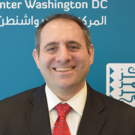Speakers

Perry Cammack
Middle East Fellow
Carnegie Endowment for International Peace

Zaha Hassan
Middle East Fellow
New America
Moderator
Event Summary
On December 12, 2017, Arab Center Washington DC (ACW) convened a panel of speakers to discuss President Donald Trump’s December 6 declaration recognizing Jerusalem as Israel’s capital. Speakers were Yousef Munayyer, Executive Director of the US Campaign for Palestinian Rights and non-resident Analyst at Arab Center Washington DC; Zaha Hassan, Middle East Fellow at New America; and Perry Cammack, Middle East Fellow at the Carnegie Endowment for International Peace.
ACW Executive Director Khalil Jahshan characterized Trump’s policy shift as an ill-advised “misstep” because it was contrary to American interests in the region and has alienated US allies, including almost every country in the region as well as in Europe, including the Vatican. Ironically, he said, Trump’s speech achieved what few others could: uniting Arabs, unifying Muslims, and re-energizing terrorists around the world, all in one fell swoop.
Yousef Munayyer said that one hundred years after the Balfour Declaration in 1917, the Trump declaration marks the end of the Oslo Accords era and the beginning of a new one. Munayyer pointed out that the 1947 UN partition plan creating one Arab and one Jewish state was against the will of the native population at that time, but it still treated Jerusalem as a separate entity. Since 1947, Jerusalem’s status has been in dispute, and the Oslo Accords postponed discussion of Jerusalem as a final status issue. Munayyer said that statements by Trump and the US ambassador to the UN, Nikki Haley, make for a confused US policy. He stated that “The American position seems to be that Jerusalem is not for negotiation, but it is, and at the same time the Americans have already awarded it to Israel.”
What Israel understands from the United States, he said, is that “if you create realities on the ground, America will have to recognize them.” This will embolden the Israelis to continue to engineer the city’s demographics to force Palestinians out, increase the size of Israeli settlements in East Jerusalem, and ensure that the city will never be divided. Israel does not have to concede anything. For their part, Palestinians will also understand that the US president has validated an Israeli narrative, with US policy on Jerusalem, Israeli settlement building, and the two-state solution having “gone out the window.” Indeed, the Palestinians now feel that there is absolutely no way the United States can continue to play a role as a mediator in this process, and PLO Chairman Mahmoud Abbas “can’t come back to Washington and remain credible in the eyes of his own people,” Munayyer asserted.
Zaha Hassan, who also was legal advisor to the Palestinian negotiating team, pointed out what the United States did not do in the context of the Jerusalem declaration, quoting the State Department’s David Satterfield as saying, “We are not taking a position on the boundaries or sovereignty in Jerusalem, including the geographic boundaries, and I will not elaborate on that further.” As for practical implications, she said that it will be interesting to observe how the United States deals with international organizations and mechanisms, like the World Trade Organization. Will Washington maintain the position that Jerusalem is occupied territory, which is the international position, she asked, or will it become a party to Israel’s illegal behavior? “US policy is going to butt heads with international law” in such dealings, she predicted.
Hassan examined the timing of this policy shift, pointing to the mid-November visit by Jared Kushner, one of Trump’s Middle East advisors, to Saudi Arabia to communicate US parameters for a peace deal—which, she said, were reported as basically Israeli Prime Minister Netanyahu’s terms. These included that the IDF would not leave the West Bank; most of Israeli settlements would remain; there would be no contiguity of Palestinian areas; and Abu Dis, the Jerusalem suburb, would serve as the Palestinian capital. After the visit, Saudi Crown Prince Mohammed bin Salman called Abbas to Riyadh and offered economic and other incentives to have him accept these terms, but Abbas rejected them. The prince delivered this message to Washington, and on December 4, Trump failed to sign the waiver to keep PLO office in Washington open.
Hassan also explained that former Trump National Security Advisor Michael Flynn had implicated Kushner and Donald Trump, Jr., in the Russia investigations, and there was a need to rally the president’s evangelical base. In Israel, on the other hand, Netanyahu was being pressured to resign. Hassan commented, “What great timing for Benjamin Netanyahu to be able to rally people around him in the midst of his corruption investigation,” and added, “What great timing for Trump amid his own problems with investigations by Mueller.” The Palestinians were also expected to be upset and react strongly to Trump’s announcement, thus taking the blame for supposedly subverting any new peace initiative.
Hassan said that Israel hopes that other countries will fall in line and recognize Jerusalem as Israel’s capital. But, she posited, “Now that the US has washed its hands of being a peace broker,” there may be a larger role for Europe, Russia, and China. There is also a campaign by European countries to recognize Palestine with East Jerusalem as its capital, based on ‘67 borders; Hassan cautioned, however, that the recognition of West Jerusalem should only come with Israel’s recognition of Palestinian rights in East Jerusalem and as Palestine’s capital, and only if it comes with a peace agreement with the Palestinians.
Perry Cammack, who also was a member of former Secretary of State John Kerry’s planning staff, said that “Jerusalem has always been an important bargaining chip for the US government” but was shocked that the American president “would give up this ‘chit’ without getting anything in response.” Considering the recognition as “negotiating malpractice,” Cammack said it is a symbolic event. For one thing, relocating the US embassy will take many years and will not affect the peace process, which has been dead for ten years. He predicted that the decision would increase the diplomatic isolation of the United States among NATO allies and international organizations, which indeed has been the case for some time. He pointed out that the Jerusalem declaration is expediting that trend, saying, “this is something like a nail in a coffin of a peace process that has been buried, rather than the coffin itself.”
Cammack noted that for Israel, there will likely be a continuation of the status quo—further settlement activity (possibly with less resistance from Washington), expanded relations with Sunni partners vis-à-vis Iran, and deteriorating relations with Europe. Even Netanyahu’s possible departure would not likely change the situation. On the other hand, he noted that Europe does not have much leverage and cannot replace the United States as a mediator. As for the Arab states, they will have a lot of diplomatic activity in the next couple of weeks, although Vice President Mike Pence will get a frosty reception during his upcoming tour of the region. But that energy will dissipate because of the current turbulent time in the Middle East. Many Arab states are “frankly more worried about Iran than Palestine,” he said. Trump himself has very little day-to-day interest in this issue; a future administration may have a different perspective on these issues in three years, and the embassy may or may not move. Fundamentally, he said, “the US is not interested in exercising a degree of political muscle necessary to force Israel to make concessions necessary for a two-state solution.”
Cammack thought that the Palestinians are the weakest party. He pointed out that a recent study by the Carnegie Endowment found that Palestinian thought leaders believe the Palestinian national movement is in a crisis. The fear, he said, is that violence is a real possibility. Cammack also noted that a “shift to rights-based approaches begins to take traction” in the form of BDS (Boycott, Divestment, and Sanctions) and civil resistance, as well as the possibility of a push toward a binational state. Cammack concluded that with demographic parity in 2017—6.4 million Palestinians and 6.4 million Israelis—coupled with a higher Palestinian birth rate, Israel would never agree to a one-state outcome with a Jewish minority.
Event Photos


